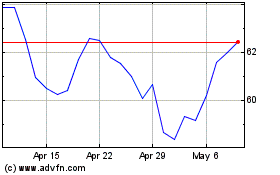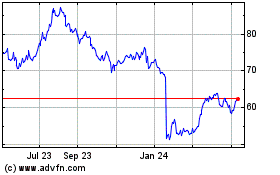Syngenta Sues Grain-Trading Firms in Corn Dispute
November 20 2015 - 1:30AM
Dow Jones News
Syngenta AG sued several grain-trading firms over losses some
U.S. farmers say they sustained after China rejected shipments of
genetically modified corn, escalating a legal battle over the way
biotech seeds are introduced to farm fields.
The lawsuit, filed late Thursday in U.S. District Court in
Kansas, stems from a legal dispute that arose last year when grain
companies and farmers sued Syngenta, arguing the company should
compensate them for lost sales and depressed corn prices that they
claim arose from the rejected shipments.
The Swiss seed and pesticide giant, which is contesting those
allegations, argued in the new lawsuit that big grain merchants,
including Cargill Inc. and Archer Daniels Midland Co., should be on
the hook for losses that crop producers say they are due in the
matter.
"We don't think there is any liability here, but to the extent
there is, at a minimum, the lion's share of the duty falls on the
grain trade," said Michael Jones, a lawyer for Kirkland & Ellis
LLP representing Syngenta in the matter.
Representatives for ADM and Cargill had no immediate
comment.
Syngenta in 2011 began selling a new variety of biotech corn
seeds—called Viptera and engineered to resist pests—to farmers in
the U.S., Argentina and Brazil after those governments granted
approval for its cultivation. In late 2013, Chinese officials began
turning away shipments of U.S. corn bound for Chinese ports after
detecting the Syngenta strain, which the country had yet to approve
for import.
Last year, Cargill sued Syngenta over the corn, alleging that
Syngenta's decision to market the seeds without first securing
Chinese import approval cost the Minnesota-based agribusiness $90
million when Beijing began rejecting corn shipments.
Other grain shippers, including Archer Daniels Midland Co., also
sued Syngenta. The grain firms' cases touched off a wave of
separate lawsuits filed by farmers across the country, who argued
that they too lost money because China's rejections of U.S. corn
shipments depressed the overall price of corn by closing off a key
market.
Syngenta has defended its move to sell the seeds, saying it
followed the law, was fully transparent and provided to farmers a
valuable new tool for defending their crops against insect
pests.
The judge for the U.S. District Court for the District of
Kansas, who is handling the farmers' lawsuits, in September ruled
that the farmers can bring legal claims against a seed company over
its duty to ensure that any biotech seeds don't damage other
players in the "interconnected" U.S. corn supply chain.
That ruling allowed the farmers' case against Syngenta to move
forward. But Syngenta's new lawsuit argues that it also places
responsibility on the grain traders, as participants in the grain
market, to shield farmers and other players against the same
potential economic damage that could arise if shipments are
rejected for containing unapproved biotech traits.
If the judge determines the farmers are due damages, Syngenta's
lawsuit argues that Cargill, ADM and two smaller grain companies
should bear some or all of the liability. Syngenta could add
additional grain companies to the lawsuit, Mr. Jones said.
Write to Jacob Bunge at jacob.bunge@wsj.com
Subscribe to WSJ: http://online.wsj.com?mod=djnwires
(END) Dow Jones Newswires
November 20, 2015 01:15 ET (06:15 GMT)
Copyright (c) 2015 Dow Jones & Company, Inc.
Archer Daniels Midland (NYSE:ADM)
Historical Stock Chart
From Mar 2024 to Apr 2024

Archer Daniels Midland (NYSE:ADM)
Historical Stock Chart
From Apr 2023 to Apr 2024
